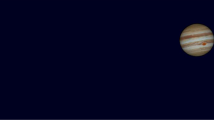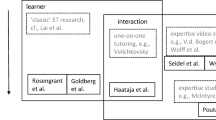Abstract
With teachers continuing to report challenges in classroom management and difficulties in implementing scientific inquiry, the current manner in which science practical work is conducted in schools suggests the need for added teacher support. In this regard, we can leverage computer vision to provide instructional support by relieving teachers of the need to carry out mundane observations and perform basic interpretations of student activity. However, to our knowledge, little is known about the noticing practices of teachers during practical work, and the support preferences of such a computer vision system have not been studied before. To this end, we recruited 17 science educators with different teaching expertise for a qualitative investigation into the noticing practices and support preferences of science teachers. Results revealed seven major categories and 36 minor categories of student activity that teachers typically observe, which enabled us to derive observation routines that can emulate quality teacher noticing for computer vision input. Our obtained list of observation categories represents a first-of-its-kind list which takes into account concrete noticing practices of science teachers and remains applicable across all types of practical tasks. From participants’ ranking of computer vision models, we further understood the type of computer vision output that teachers prefer for instructional support. To our best of knowledge, no prior research has examined the connection between teacher noticing and computer vision in such detail. Using these findings, we can then pursue the development of computer vision for instructional support in science practical work in an informed manner, taking into account the realities of science laboratories and proclivities of science teachers.



Similar content being viewed by others
Availability of Data and Materials
The data that support the findings of this study are available from Harvard University and Nanyang Technological University, but restrictions apply to the availability of these data, which were used under license for the current study and so are not publicly available. The data are, however, available from the authors upon reasonable request and with the permission of Harvard University and Nanyang Technological University.
References
Abrahams, I., & Millar, R. (2008). Does practical work really work? A study of the effectiveness of practical work as a teaching and learning method in school science. International Journal of Science Education, 30(14), 1945–1969.
Abrahams, I., Reiss, M. J., & Sharpe, R. (2014). The impact of the “Getting Practical: Improving Practical Work in Science” continuing professional development programme on teachers’ ideas and practice in science practical work. Research in Science & Technological Education, 32(3), 263–280.
England, B. J., Brigati, J. R., & Schussler, E. E. (2017). Student anxiety in introductory biology classrooms: Perceptions about active learning and persistence in the major. PLoS ONE, 12(8), e0182506.
Falloon, G. (2017). Mobile devices and apps as scaffolds to science learning in the primary classroom. Journal of Science Education and Technology, 26, 613–628.
Fisteus, J. A., Pardo, A., & García, N. F. (2013). Grading multiple choice exams with low-cost and portable computer-vision techniques. Journal of Science Education and Technology, 22(4), 560–571.
Gallagher, J. J., & Tobin, K. (1987). Teacher management and student engagement in high school science. Science Education, 71(4), 535–555.
Goodwin, C. (1994). Professional vision. American Anthropologist, 96(3), 606–633.
Hodson, D. (1991). Practical work in science: Time for a reappraisal. Studies in Science Education, 19, 175–184.
Hodson, D. (1996). Practical work in school science: Exploring some directions for change. International Journal of Science Education, 18(7), 755–760.
Parker-Katz, M., & Bay, M. (2008). Conceptualizing mentor knowledge: Learning from the insiders. Teaching and Teacher Education, 24(5), 1259–1269.
Pine, J., Aschbacher, P., Roth, E., Jones, M., McPhee, C., Martin, C., Phelps, S., Kyle, T., & Foley, B. (2006). Fifth graders’ science inquiry abilities: A comparative study of students in hands-on and textbook curricula. Journal of Research in Science Teaching: THe Official Journal of the National Association for Research in Science Teaching, 43(5), 467–484.
Pun, J. K. H., & Cheung, K. K. C. (2023). Meaning making in collaborative practical work: A case study of multimodal challenges in a year 10 chemistry classroom. Research in Science & Technological Education, 41(1), 271–288.
Sherin, M. (2007). The development of teachers’ professional vision in video clubs. In R. Goldman, R. Pea, B. Barron, & S. J. Derry (Eds.), Video research in the learning sciences (pp. 383–396). Erlbaum.
Shulman, L. (1987). Knowledge and teaching: Foundations of the new reform. Harvard Educational Review, 57(1), 1–23.
Welch, W. W. (1981). The role of inquiry in science education: Analysis and recommendations. Science Education, 65(1), 33–50.
Zhu, L., Sun, D., Luo, M., Liu, W., & Xue, S. (2024). Investigating pre-service science teachers’ design performance in laboratory class: The inquiry-based design thinking approach. Journal of Science Education and Technology, 33, 30–44.
Millar, R., Le Maréchal, J. F., & Tiberghien, A. (1999). “Mapping” the domain-varieties of practical work. In Practical work in science education: Recent research studies (pp. 33–59). University of Roskilde Press.
Tiberghien, A. (2000). Designing teaching situations in the secondary school. Improving science education: The contribution of research, 27–47.
Wellington, J. (1998). Practical work in science. Time for a reappraisal. In J. Wellington (Ed.), Practical work in school science: Which way now? (pp. 3–15). London: Routledge.
Funding
No funding was received to assist with the preparation of this manuscript.
Author information
Authors and Affiliations
Contributions
The sole author (Edwin Chng) contributed to the study conception and design. Material preparation, data collection, and analysis were performed by Edwin Chng. The first and subsequent drafts of the manuscript were written by Edwin Chng. Edwin Chng read and approved the final manuscript.
Corresponding author
Ethics declarations
Ethical Approval
The survey, interviews, and methodology for this study were approved by Harvard University-Area Committee on the Use of Human Subjects (IRB22-1470) and Nanyang Technological University Institutional Review Board (IRB-2022–991).
Informed Consent
Informed consent was obtained from all individual participants included in the study.
Consent to Participate
Informed consent was obtained from all individual participants included in the study.
Consent for Publication
Not applicable.
Competing Interests
The author declares no competing interests.
Additional information
Publisher's Note
Springer Nature remains neutral with regard to jurisdictional claims in published maps and institutional affiliations.
Rights and permissions
Springer Nature or its licensor (e.g. a society or other partner) holds exclusive rights to this article under a publishing agreement with the author(s) or other rightsholder(s); author self-archiving of the accepted manuscript version of this article is solely governed by the terms of such publishing agreement and applicable law.
About this article
Cite this article
Chng, E. Designing Computer Vision Support for Science Practical Work: A Qualitative Investigation into the Noticing Practices and Support Preferences of Science Teachers. J Sci Educ Technol (2024). https://doi.org/10.1007/s10956-024-10116-w
Accepted:
Published:
DOI: https://doi.org/10.1007/s10956-024-10116-w




